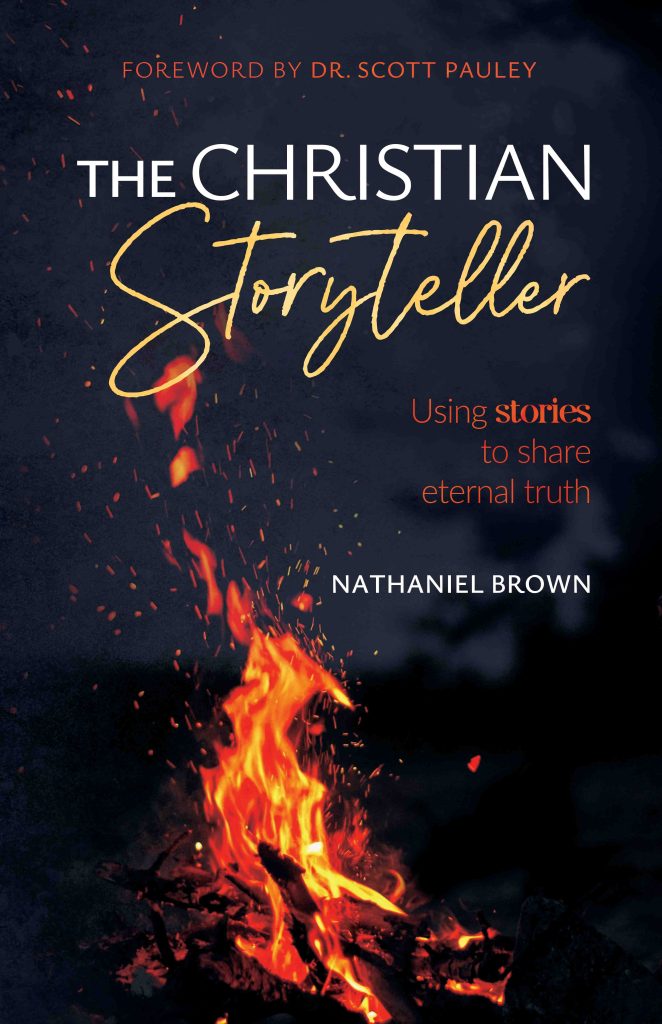A review of Nathaniel Brown’s book, The Christian Storyteller, using stories to share eternal truth copyright 2024

If you are like me, you enjoy hearing good stories but don’t give much thought to how or why you tell them. That changed for me when I read Nathaniel Brown’s engaging book! Why do we need a book for Christian storytellers? Because anyone who wants to “influence others with the Word of God can and should use stories to engagingly share God’s truth.”
Brown does an excellent job of helping readers understand the power of stories and how to get better at telling them. He describes what makes a good story, how to structure one, and use it for a good purpose. Of course, he illustrates points and suggestions with stories from the Bible, history, and his own life.
Stories have many purposes from reminding to teaching theology. Brown even shows how they can be used to confront wrongs. Yet, he provides warnings to keep you from misusing stories or from pitfalls that can make them boring or worthless. I appreciate his practical steps, Biblical reflection questions, and appendices with tips and resources.
This book will be a valuable resource for anyone who wants to be an effective storyteller and is highly recommended!
Book Summary of The Christian Storyteller
Do you think of yourself as a storyteller? Everyone tells stories at some point. I love hearing good stories but hadn’t given much thought to how or why I told them. That changed when I read Nathaniel Brown’s engaging book. Why do we need a book for Christian storytellers? Because anyone who wants to “influence others with the Word of God can and should use stories to engagingly share God’s truth.”
How well do you remember the last sermon or Bible lesson you heard? Sadly, many of them are not memorable. What might change that? A well told story. If you research strong communicators, you’ll find that most of them effectively harness the power of stories. “The Bible helps us grasp who God is, what He does, what He wants, and what He hates – and the majority of its most compelling lessons come to us in story form.” (p.11) Many of God’s servants in the Bible from the ancient prophets to Stephen the martyr were storytellers and so are you!
Brown does an excellent job of helping readers understand the power of stories and how to get better at telling them. He even distinguishes between telling fictional stories and being truthful with real ones.
In chapter 3 of The Christian Storyteller, Brown makes the point that the best stories are about people. For example, history facts might be boring, but if you heard about a person who lived through those facts, history could be very exciting. A good story will make a listener want to know who the characters are and what they are like on the inside, not just their appearance. It is interesting that the Bible rarely describes physical features but helps you know people through their words and actions. When we see a life transformation it makes an impact.
Brown gives keys to bringing stories to life in chapter 4 and tells how to structure them in chapter 5. How do you let a reader or hearer discover things, feel suspense, and cause them to think? We have a good example from the account of Peter’s denial of Jesus in the Gospels. You get some description of the location and people, some dialogue, then you hear the rooster, and see Peter crying. You are not told what he is thinking but you know exactly what he feels and can’t help but ask yourself, could you deny Jesus?
I like that Brown took time to discuss the five levels of communication and apply them to storytelling. From recognition to understanding, interest to investment, you can move an audience to application of life changing truth with a story. They can not only remind us, but help ground us in theology. Consider kings Saul and David who were both confronted by prophets after they sinned. The prophets reminded them of their humble origins and how God exalted them, yet they forgot the Lord’s commands.
Stories not only remind or get points across, they can persuade. “Stories are one of the most effective ways to challenge preconceptions.” (p.109) This is important because the Gospel is a story. Yes, it is the facts about Jesus dying to pay for our sins, but it is His story and is much more than just details. Why did He come, what did He do, how did He help people, and what makes Jesus the Savior is the very compelling Gospel story.
Brown encourages readers to evangelize with stories. Even if you are not the best storyteller (of course you can improve by using the suggestions in The Christian Storyteller) you can tell your story and how the Gospel impacted you. “A personal testimony of salvation helps other see what it looks like to respond to Christ.” (p. 126) People can meet Jesus at any age or in any life circumstance. Your story can illustrate that and help them meet Jesus, too!
Stories have many purposes and Brown even shows how they can be used to confront wrongs. Yet, he provides warnings to keep you from misusing stories or from pitfalls that can make them boring or worthless. I appreciate his practical steps, Biblical reflection questions, and appendices with tips and resources. This book will be a valuable aid for anyone who wants to be an effective storyteller.
You can learn more about the author and see how to get The Christian Storyteller at: https://www.christianstorytellerbook.com/
